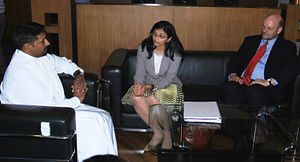Nisha Biswal, the U.S. State Department’s assistant secretary of state for South and Central Asian affairs, spoke at the Center for a New American Security (CNAS), a Washington, D.C.-based think tank, on Monday. Her prepared remarks were brief and broad. Again we witnessed a senior official in the Barack Obama administration praising Sri Lanka’s recent “democratic transition.” Here’s part of what Biswal said:
Sri Lanka deserves special attention as it continues to consolidate democratic gains in the past two elections and put the country on a path to reconciliation. The United States was among the first to welcome these moves and offer our support and assistance. Both Secretary Kerry and Ambassador Power visited last year – and I myself visited four times in 2015 – and this year we launched our first-ever Partnership Dialogue.
While there is still much to be done to pursue justice, strengthen political rights, and establish enduring peace, the current government has shown that it is committed to moving the country forward: among many other moves, it has already returned over 3,400 acres to displaced families, including another 177 acres just this past week. USAID has launched several programs to stimulate economic growth and development in the country’s north and east, and U.S. businesses are seeing many new and attractive investment opportunities.
Biswal is right to assert that there remains plenty of work to be done, yet the Obama administration’s continued optimism looks misguided. Much of the new government’s reform agenda remains incomplete and, if the coalition government is serious about moving forward on the most difficult issues, including transitional justice, then they have an unusual way of showing it. It’s in that context that the U.S. should maintain diplomatic pressure and emphasize that a deepening of bilateral ties will not happen until more progress is made.
Unfortunately, over the past several days, we’ve seen some disappointing moves from the U.S. embassy in Sri Lanka. Just days ago, the U.S. Navy collaborated with the Sri Lankan military to perform a concert in Colombo, the capital. The embassy actively promoted the event on social media. Tamil Guardian, a London-based news outlet has a good write-up about what transpired. Another event held later, on Monday, is cause for concern too.
Why does this matter?
These recent diplomatic gestures matter greatly in the context of promoting human rights, accountability and reconciliation in what remains a divided, post-war society. Let’s not forget that Sri Lanka’s (almost exclusively Sinhalese) military has been accused of appalling abuses against Tamil civilians, including war crimes and crimes against humanity. Since the conclusion of war, the military has also been involved in ongoing human rights violations, including sexual violence and torture. The military’s strong presence in the Tamil-dominated Northern and Eastern Provinces, nearly seven years after the war’s finish, makes things even worse and indubitably fuels ongoing human rights violations.
Essentially, over the past few days, the U.S. has been sending the wrong message to both the Sri Lankan government and the war weary Tamil community, the group that suffered the most as a result of the war. When planning future events on the island, hopefully the U.S. will not make the same mistake twice. Going forward, Washington needs to be more consistent when it comes to promoting human rights and accountability in Sri Lanka.

































